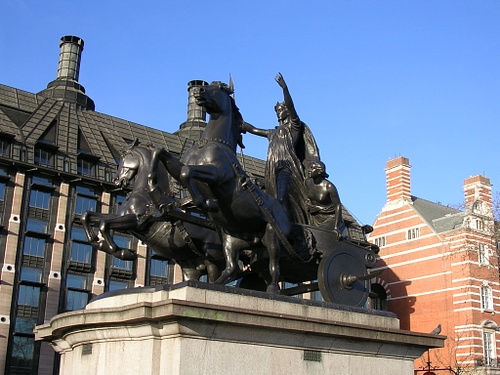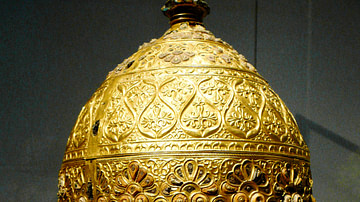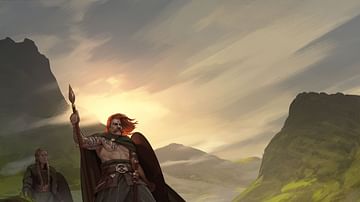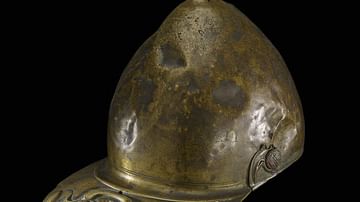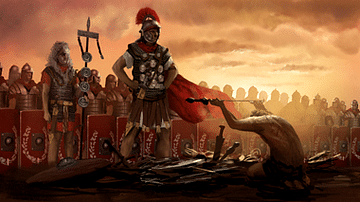Boudicca (died 61 CE) was the Celtic Queen of the Iceni tribe who led a revolt against Roman occupation of what is now East Anglia, England. So charismatic was Boudicca that ancient sources record tribes joining her revolt which would not normally have supported an Iceni-led objective. Boudicca was the wife of the Iceni King Prasutagus who ruled his lands as an independent ally of Rome and who, therefore, left his estate divided between Emperor Nero of Rome and Prasutagus' wife and two daughters. Upon his death, however, the Iceni lands were usurped by Rome, Boudicca was flogged and her daughters were raped by the Romans for daring to presume they had rights which should be recognized by Rome.
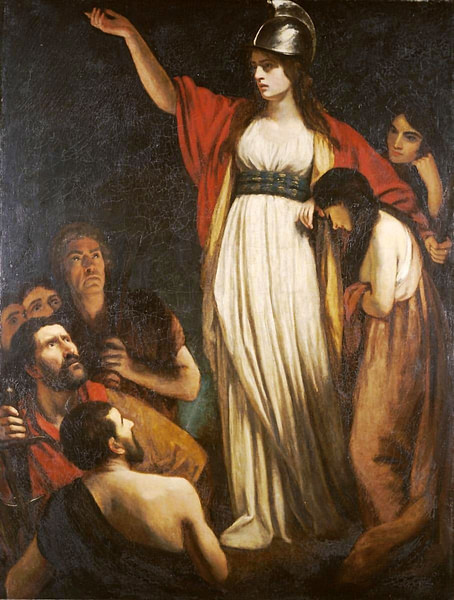
Boudicca quickly rallied her tribe and attacked the city of Camulodunum (Colchester of today) where she massacred the inhabitants and burned the city. The Roman Governor Gaius Suetonius Paulinus, busy campaigning on the Anglesey island of Mona, hurried back to put down Boudicca's revolt. In the meantime, she had attacked and destroyed Londinium (London) and Verulamium (St. Albans) resulting in over 80,000 Roman citizens massacred. The Roman historian Tacitus reports:
The natives enjoyed plundering and thought of nothing else. By-passing forts and garrisons, they made for where loot was richest and protection weakest. Roman and provincial deaths at the places mentioned are estimated at seventy thousand. For the Britons did not take or sell prisoners, or practice war-time exchanges. They could not wait to cut throats, hang, burn, and crucify—as though avenging, in advance, the retribution that was on its way (Annals, Book XIV, 33).
Cassius Dio, the other primary source on Boudicca's revolt, writes,
Buduica led her army against the Romans; for these chanced to be without a leader, inasmuch as Paulinus, their commander, had gone on an expedition to Mona, an island near Britain. This enabled her to sack and plunder two Roman cities, and, as I have said, to wreak indescribable slaughter. Those who were taken captive by the Britons were subjected to every known form of outrage. The worst and most bestial atrocity committed by their captors was the following. They hung up naked the noblest and most distinguished women and then cut off their breasts and sewed them to their mouths, in order to make the victims appear to be eating them; afterwards they impaled the women on sharp skewers run lengthwise through the entire body. All this they did to the accompaniment of sacrifices, banquets, and wanton behaviour, not only in all their other sacred places, but particularly in the grove of Andate. This was their name for Victory, and they regarded her with most exceptional reverence (Book LXII).
Boudicca was defeated at the Battle of Watling Street in 61 CE by Suetonius who judiciously chose the site of the battle to favor his fewer numbers. He also had the good fortune in Boudicca's forces feeling so confident of victory that they cut off their own line of escape with their wagons, pack animals, and the families they had brought along to watch their final victory over Rome. The numerically superior Britons were beaten back by the Roman forces of Suetonius (who held the better strategic position) and became trapped between the advancing Roman army and their own supply train. There were so many, in so small a space, that they had no where to run and were pressed too closely together to counter-charge and fight, turning the battle into a rout and then a massacre. According to Tacitus, even women and children were not spared, "It was a glorious victory, comparable with bygone triumphs. According to one report almost eighty thousand Britons fell. Our own casualties were about four hundred dead and a slightly larger number of wounded. Boudica poisoned herself “(Annals, Book XIV, 37).
Boudicca and her revolt is further described by Cassius Dio:
...a terrible disaster for the Romans occurred in Britain. Two cities were sacked, eighty thousand of the Romans and of their allies perished, and the island was lost to Rome. Moreover, all this ruin was brought upon the Romans by a woman, a fact which in itself caused them the greatest shame....But the person who was chiefly instrumental in rousing the natives and persuading them to fight the Romans, the person who was thought worthy to be their leader and who directed the conduct of the entire war, was Buduica, a Briton woman of the royal family and possessed of greater intelligence than often belongs to women....In stature she was very tall, in appearance most terrifying, in the glance of her eye most fierce, and her voice was harsh; a great mass of the tawniest hair fell to her hips; around her neck was a large golden necklace, and she wore a tunic of divers colours over which a thick mantle was fastened with a brooch. This was her invariable attire (Roman History, LXII.1-2).
It was long held that Boudicca's grave was located beneath Platform 10 of King's Cross Railway Station in London (giving rise to many myths and legends concerning Platform 10) but this claim has been discredited. A statue of Boudicca and her daughters was completed in 1905 CE, commissioned by Prince Albert, and stands near the Houses of Parliament and Westminster Bridge near London; the very city which she once burned to the ground.
